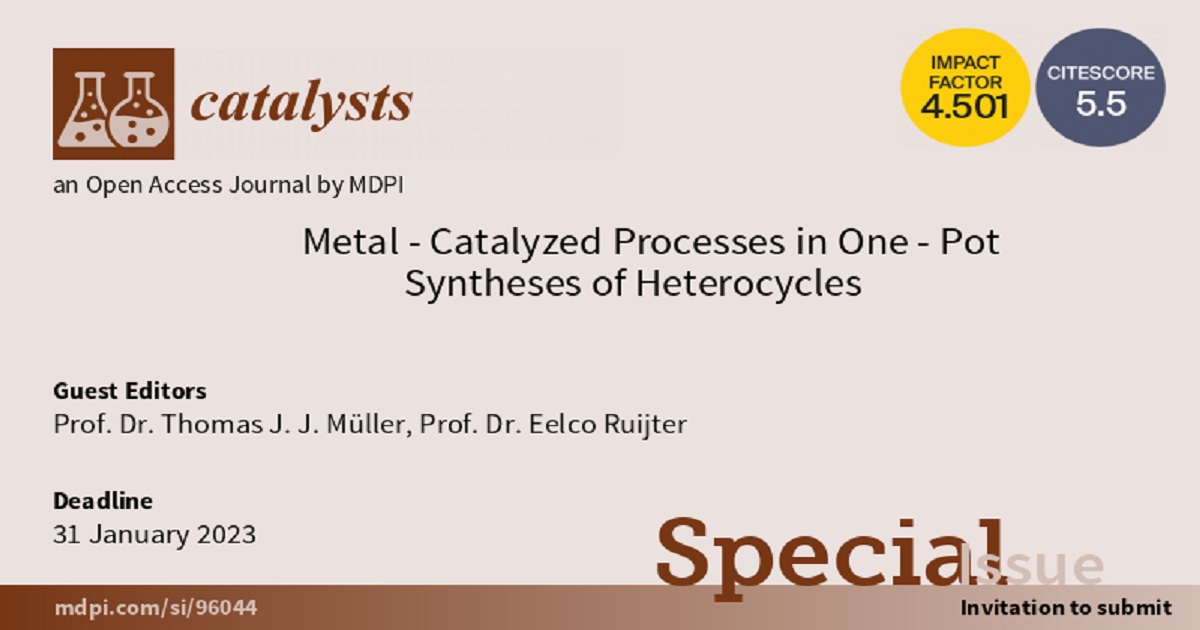- 4.0Impact Factor
- 7.6CiteScore
- 16 daysTime to First Decision
Metal-Catalyzed Processes in One-Pot Syntheses of Heterocycles
This special issue belongs to the section “Catalysis in Organic and Polymer Chemistry“.
Special Issue Information
Dear Colleagues,
The advent of metal catalysis has provided a fascinating tool for significantly facilitating the synthesis of complex and functional molecules as well as natural products. In particular, the broad tolerance for many polar functional groups has set the stage for going beyond simple ligation by forming a single bond between two reactants. Therefore, metal catalysis has opened new avenues to one-pot processes, where all elementary steps proceed in the same reaction vessel. Among these one-pot reactions are multicomponent and domino reactions as well as metal-catalyzed cascade reactions. This Special Issue aims to offer a stage for sharing and discussing recent results from your laboratories on this fascinating synthetic strategy. Furthermore, it will stimulate the scientific community to further develop the concept.
We look forward to receiving your esteemed contributions to this Special Issue.
Prof. Dr. Thomas J. J. Müller
Prof. Dr. Eelco Ruijter
Guest Editors
Manuscript Submission Information
Manuscripts should be submitted online at www.mdpi.com by registering and logging in to this website. Once you are registered, click here to go to the submission form. Manuscripts can be submitted until the deadline. All submissions that pass pre-check are peer-reviewed. Accepted papers will be published continuously in the journal (as soon as accepted) and will be listed together on the special issue website. Research articles, review articles as well as short communications are invited. For planned papers, a title and short abstract (about 250 words) can be sent to the Editorial Office for assessment.
Submitted manuscripts should not have been published previously, nor be under consideration for publication elsewhere (except conference proceedings papers). All manuscripts are thoroughly refereed through a single-blind peer-review process. A guide for authors and other relevant information for submission of manuscripts is available on the Instructions for Authors page. Catalysts is an international peer-reviewed open access monthly journal published by MDPI.
Please visit the Instructions for Authors page before submitting a manuscript. The Article Processing Charge (APC) for publication in this open access journal is 2200 CHF (Swiss Francs). Submitted papers should be well formatted and use good English. Authors may use MDPI's English editing service prior to publication or during author revisions.
Keywords
- cascade reactions
- consecutive sequences
- domino reactions
- multicomponent reactions
- one-pot reactions
- sequential catalysis

Benefits of Publishing in a Special Issue
- Ease of navigation: Grouping papers by topic helps scholars navigate broad scope journals more efficiently.
- Greater discoverability: Special Issues support the reach and impact of scientific research. Articles in Special Issues are more discoverable and cited more frequently.
- Expansion of research network: Special Issues facilitate connections among authors, fostering scientific collaborations.
- External promotion: Articles in Special Issues are often promoted through the journal's social media, increasing their visibility.
- Reprint: MDPI Books provides the opportunity to republish successful Special Issues in book format, both online and in print.


